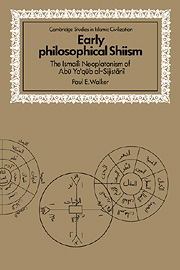Book contents
- Frontmatter
- Contents
- Preface
- Acknowledgments
- Note on transliteration
- List of abbreviations
- PART I AL-SIJISTĀNĪ'S HERITAGE
- PART II AL-SIJISTĀNĪ'S UNIVERSE
- 4 Introduction: categories of thought and terms of analysis
- 5 A theology of unqualified transcendence
- 6 Creation as command
- 7 Intellect, the sum of existent being
- 8 Descending and ascending soul
- 9 Nature and the physical realm
- 10 A cosmic anthropology
- 11 Prophecy, the deputy of intellect
- 12 Interpretation and its institution
- 13 Salvation and the womb of history
- EPILOGUE: THE USE AND CONTROL OF REASON
- Notes
- Select bibliography
- Index
8 - Descending and ascending soul
Published online by Cambridge University Press: 02 November 2009
- Frontmatter
- Contents
- Preface
- Acknowledgments
- Note on transliteration
- List of abbreviations
- PART I AL-SIJISTĀNĪ'S HERITAGE
- PART II AL-SIJISTĀNĪ'S UNIVERSE
- 4 Introduction: categories of thought and terms of analysis
- 5 A theology of unqualified transcendence
- 6 Creation as command
- 7 Intellect, the sum of existent being
- 8 Descending and ascending soul
- 9 Nature and the physical realm
- 10 A cosmic anthropology
- 11 Prophecy, the deputy of intellect
- 12 Interpretation and its institution
- 13 Salvation and the womb of history
- EPILOGUE: THE USE AND CONTROL OF REASON
- Notes
- Select bibliography
- Index
Summary
The mate of intellect is soul and the two together form the two roots (aṣlān) of the spiritual world as it exists independently of physical being. The concept of soul is particularly important in Neoplatonism because it is soul and not intellect per se that bridges the gap between the theoretical life of pure mind and the complex realm in which the human being plays out the struggle to avoid the temptation of material existence. The Islamic Aristotelians denied that such a soul is something other than a form of intellect, and there is no clearer issue of difference separating these two factions in Islamic philosophy. Those, like al-Sijistānī, who made of the soul a universal, hypostatic being, as well as the permanently enduring, animating spirit of the individual human, were few. His ultimate inspiration for this can only have been Plotinus but as with so many of the other ideas he took from ancient sources the parallels for his doctrine of the soul in the existing materials are in portions of the Longer Theologia which do not have a known Greek source.
Significantly, the pair intellect and soul were so prominent in the teaching of the Ismailis following al-Sijistānī that they became viewed as characteristic elements of their thought.
- Type
- Chapter
- Information
- Early Philosophical ShiismThe Isma'ili Neoplatonism of Abu Ya'qub al-Sijistani, pp. 95 - 101Publisher: Cambridge University PressPrint publication year: 1993

